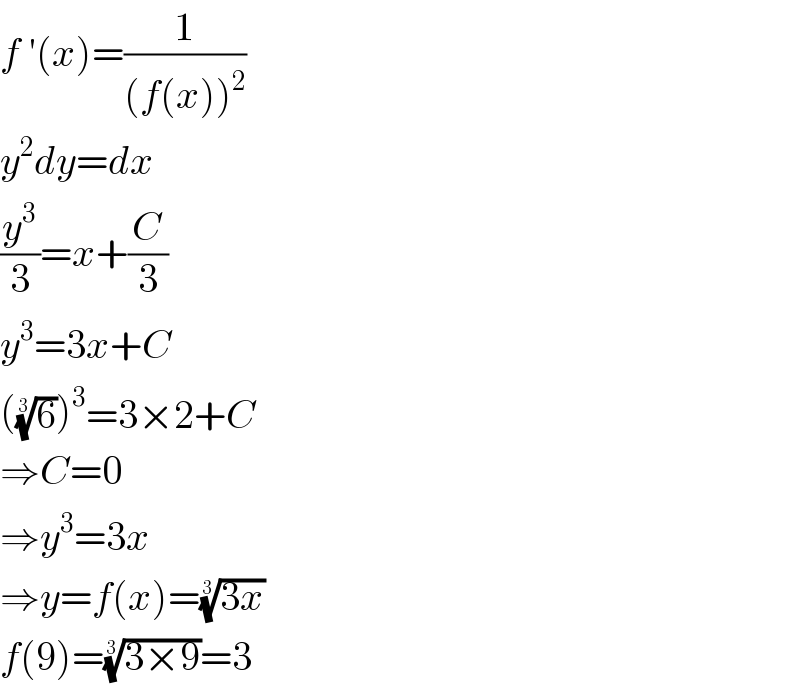
Question Number 118663 by benjo_mathlover last updated on 19/Oct/20
![Given f(x) = ∫ _0 ^x (dt/([f(t)]^2 )) and ∫ _0 ^2 (dt/([ f(t)]^2 )) = (6)^(1/(3 )) Then then the value of f(9) is __](Q118663.png)
$$\:{Given}\:{f}\left({x}\right)\:=\:\int\:\underset{\mathrm{0}} {\overset{{x}} {\:}}\:\frac{{dt}}{\left[{f}\left({t}\right)\right]^{\mathrm{2}} }\:\:{and}\:\int\:\underset{\mathrm{0}} {\overset{\mathrm{2}} {\:}}\:\frac{{dt}}{\left[\:{f}\left({t}\right)\right]^{\mathrm{2}} }\:=\:\sqrt[{\mathrm{3}\:}]{\mathrm{6}}\: \\ $$$${Then}\:{then}\:{the}\:{value}\:{of}\:{f}\left(\mathrm{9}\right)\:{is}\:\_\_ \\ $$
Commented by mr W last updated on 19/Oct/20

$${f}\:'\left({x}\right)=\frac{\mathrm{1}}{\left({f}\left({x}\right)\right)^{\mathrm{2}} } \\ $$$${y}^{\mathrm{2}} {dy}={dx} \\ $$$$\frac{{y}^{\mathrm{3}} }{\mathrm{3}}={x}+\frac{{C}}{\mathrm{3}} \\ $$$${y}^{\mathrm{3}} =\mathrm{3}{x}+{C} \\ $$$$\left(\sqrt[{\mathrm{3}}]{\mathrm{6}}\right)^{\mathrm{3}} =\mathrm{3}×\mathrm{2}+{C} \\ $$$$\Rightarrow{C}=\mathrm{0} \\ $$$$\Rightarrow{y}^{\mathrm{3}} =\mathrm{3}{x} \\ $$$$\Rightarrow{y}={f}\left({x}\right)=\sqrt[{\mathrm{3}}]{\mathrm{3}{x}} \\ $$$${f}\left(\mathrm{9}\right)=\sqrt[{\mathrm{3}}]{\mathrm{3}×\mathrm{9}}=\mathrm{3} \\ $$
Commented by 1549442205PVT last updated on 19/Oct/20

$$\mathrm{Great}!\mathrm{Sir}. \\ $$
Answered by benjo_mathlover last updated on 19/Oct/20
![by Theorem Fundamental Calculus−1 f ′(x) = ∫_0 ^x f(t) dt . Given equation f(x) = ∫_0 ^x (dt/([ f(t) ]^2 )) ⇒ f ′(x) = (1/([ f(x) ]^2 )) ⇒ [ f(x)]^2 d(f(x)) = dx , integrating both sides ∫ [ f(x)]^2 dx = ∫ dx (1/3) [f(x)]^3 = x + C ⇒ so f(x) = ((3x+λ ))^(1/(3 )) , λ=3C thus ∫_0 ^( 2) (dt/([ f(t) ]^2 )) = f (2)= (6)^(1/(3 )) we get f (2)=((6+λ))^(1/(3 )) =(6)^(1/(3 )) , give λ=0 Thus f(x) = ((3x))^(1/(3 )) and f(9) = ((27))^(1/(3 )) = 3](Q118688.png)
$${by}\:{Theorem}\:{Fundamental}\:{Calculus}−\mathrm{1} \\ $$$${f}\:'\left({x}\right)\:=\:\underset{\mathrm{0}} {\overset{{x}} {\int}}\:{f}\left({t}\right)\:{dt}\:.\:{Given}\:{equation} \\ $$$$\:{f}\left({x}\right)\:=\:\underset{\mathrm{0}} {\overset{{x}} {\int}}\:\frac{{dt}}{\left[\:{f}\left({t}\right)\:\right]^{\mathrm{2}} }\:\Rightarrow\:{f}\:'\left({x}\right)\:=\:\frac{\mathrm{1}}{\left[\:{f}\left({x}\right)\:\right]^{\mathrm{2}} } \\ $$$$\Rightarrow\:\left[\:{f}\left({x}\right)\right]^{\mathrm{2}} \:{d}\left({f}\left({x}\right)\right)\:=\:{dx}\:,\:{integrating} \\ $$$${both}\:{sides}\:\int\:\left[\:{f}\left({x}\right)\right]^{\mathrm{2}} \:{dx}\:=\:\int\:{dx} \\ $$$$\:\frac{\mathrm{1}}{\mathrm{3}}\:\left[{f}\left({x}\right)\right]^{\mathrm{3}} \:=\:{x}\:+\:{C} \\ $$$$\Rightarrow\:{so}\:{f}\left({x}\right)\:=\:\sqrt[{\mathrm{3}\:}]{\mathrm{3}{x}+\lambda\:}\:,\:\lambda=\mathrm{3}{C} \\ $$$${thus}\:\int_{\mathrm{0}} ^{\:\mathrm{2}} \:\frac{{dt}}{\left[\:{f}\left({t}\right)\:\right]^{\mathrm{2}} }\:=\:{f}\:\left(\mathrm{2}\right)=\:\sqrt[{\mathrm{3}\:}]{\mathrm{6}} \\ $$$${we}\:{get}\:{f}\:\left(\mathrm{2}\right)=\sqrt[{\mathrm{3}\:}]{\mathrm{6}+\lambda}\:=\sqrt[{\mathrm{3}\:}]{\mathrm{6}}\:,\:{give}\:\lambda=\mathrm{0} \\ $$$${Thus}\:{f}\left({x}\right)\:=\:\sqrt[{\mathrm{3}\:}]{\mathrm{3}{x}}\:{and}\:{f}\left(\mathrm{9}\right)\:=\:\sqrt[{\mathrm{3}\:}]{\mathrm{27}}\:=\:\mathrm{3} \\ $$
